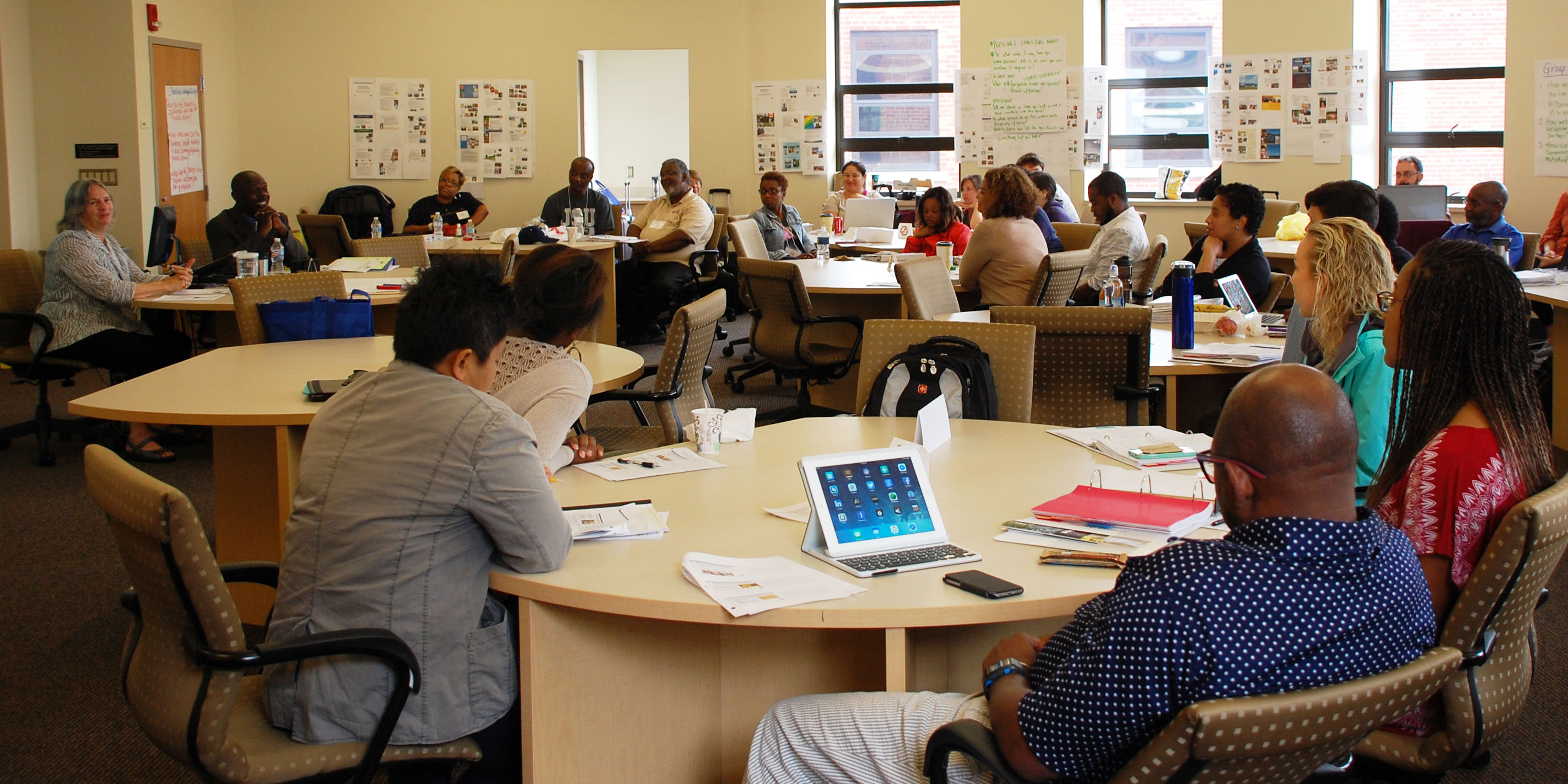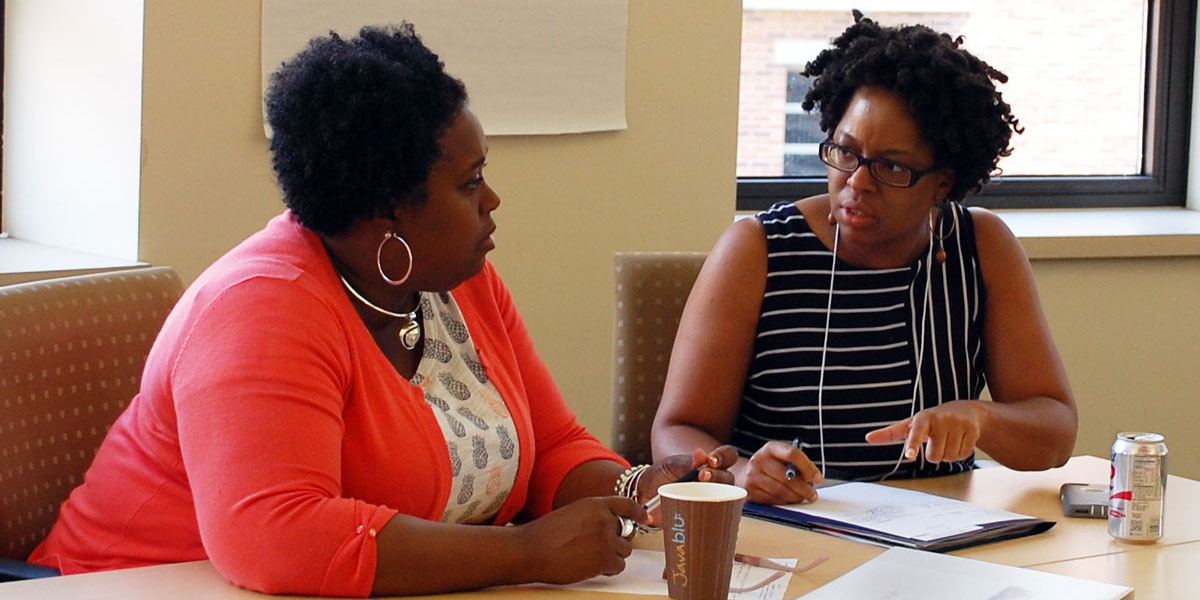CBPR Partnership Academy (Cohort Two)
California Teams
San Ysidro Health Center & San Diego State University
With a shared interest in reproductive health and adolescent health, particularly in San Diego’s “South Bay” (which includes the U.S.-Mexico border region), this team’s overall goals fall under three areas: 1) personality/work style understanding and development, 2) skill development, and 3) assessment and response to community needs. Ilana Brongiel and Eric Buhi are both relatively new to community-based participatory research (CBPR) and in the early stages of forming a CBPR partnership. Having met and “strategized” about community needs and working together, this team says that very few people or organizations are working on issues related to adolescent reproductive health in their area. These partners were first introduced in the fall of 2014 (during Eri Buhi’s first semester at SDSU) while both were serving on a local school district advisory committee. The two have been actively pursuing large project grants to support their new CBPR partnership.
- Ilana J. Brongiel, who holds a Master of Public Health (MPH) degree in International Community Health Education (NYU), serves as the Manager of the Center for Latino Research and Health Promotion at San Ysidro Health Center (SYHC) in San Diego. She has been at the SYHC for nearly 13 years and has spent much of that time working to improve access to reproductive health for adolescents.
- Eric R. Buhi, who holds both MPH and doctoral degrees in Public Health Education, is an academic researcher and associate professor at San Diego State University, where he has been for nearly two years. His research focus is to: 1) understand and promote sexual health among young people; and 2) employ innovative technologies for health promotion and behavior change.
Kashia Band of Pomo Indians & the California Tribal Epidemiology Center
Nina Hapner and Andrew Crawford will work collaboratively to establish a CBPR partnership for the Kashia Community and the California Tribal Epidemiology Center. With direction from the Kashia Tribe and support from the California Rural Indian Health Board, the main objective of their partnership will be to address tribal concerns to improve health conditions overall for Kashia Tribal members, with a particular focus on diabetes. Once the team establishes a workable CBPR program for diabetes, their long-term goal is to be able to apply this model to address other tribal health concerns.
- Nina Hapner. With a degree in Wildlife Biology, Nina Hapner serves as the Director of Environmental Planning for the Kashia Band of Pomo Indians of Stewarts Point Rancheria in Santa Rosa, California. She has been with the organization for seven years.
- Andrew J. Crawford, who holds a doctorate in Social Psychology, is an epidemiologist for the California Rural Indian Health Board and California Tribal Epidemiology Center, located in Sacramento.
Lao Family Community Empowerment, Inc. & the University of the Pacific
This Community-Academic Partnership (CAP) represents Lao Family Community Empowerment, Inc. (LFCE) and the University of the Pacific (UOP). Their collective objectives are to learn and apply the CBPR principles to promote social justice and reduce social and health inequalities among the Hmong, Lao, and Latino communities in San Joaquin County; build a long-term and sustainable CBPR partnership between LFCE and UOP; empower the community as equal partners in the research process; develop community-driven education programs aimed at reducing health disparities; and build an infrastructure that will allow for long-term engagement and collaboration in the research process. With these overall objectives, they also envision providing effective leadership and advocacy training to community leaders and members to empower them to advocate for themselves towards system and policy change in accessing culturally appropriate health care and support local initiatives designed to promote positive mental health and emotional well-being for refugee and immigrant families in San Joaquin County, California.
- Ger Vang, who holds a master’s degree in Education, serves as Chief Executive Officer of the Lao Family Community Empowerment, Inc. in Stockton, California. He has been with this non-profit organization for eight years.
- Ethel Nicdao is Associate Professor and Chair of Sociology at the University of the Pacific in Stockton, California. She has a PhD in Sociology and was trained as a medical sociologist in qualitative and quantitative research methods.
Georgia Teams
Center for Black Women’s Wellness & the Morehouse School of Medicine
The Center for Black Women’s Wellness and the Morehouse School of Medicine will work together to address adolescent pregnancy and STD prevention in an underserved community within the city of Atlanta, Georgia. Their objectives for this partnership are: 1) to conduct CBPR projects as identified through this partnership; 2) integrate their knowledge and action for mutual benefit of all partners and promote a co-learning and empowering process that attends to social inequalities related to sexual and reproductive health; and 3) work together to create the evidence to support sexual and reproductive polices that affect their community. They hope to start with the creation of a culturally-tailored intervention aimed at addressing risky sexual behavior to ultimately reduce sexual and reproductive health disparities among ethno-racial minorities.
- Keri M. Pridgeon, who has an MPH focused on Maternal and Child Health, serves as the Vice President and Director of Programs for the Center for Black Women’s Wellness, Inc. in Atlanta, Georgia. She has worked for this organization for more than 16 years.
- Natalie D. Hernandez. With both master’s and doctoral degrees in Public Health, Natalie Hernandez is an academic researcher and assistant professor at Atlanta’s Morehouse School of Medicine. Her research interests include reproductive and sexual health disparities, social determinants of health, CBPR, and health policy.
Redeemer’s Medical Center & the Satcher Health Leadership Institute, Morehouse School of Medicine
Redeemer's Medical Center (RMC) is a 501(c) (3) community-based organization that provides free healthcare services and health awareness programs to the minority, vulnerable, and uninsured populations in the Norcross, Buford, and Atlanta areas of Georgia. Through this partnership, Joseph Takon and Oluwatoyosi Adekeye hope to: 1) foster a community-academic partnership between RMC and the Satcher Health Leadership Institute at the Morehouse School of Medicine and 2) develop shared research interests in health disparities disproportionately affecting African immigrants in the United States.
- Joseph Takon, the Founder and CEO of Redeemer's Medical Center, earned a Bachelor of Science degree in Health Sciences and a medical degree (Bachelor of Medicine and Bachelor of Surgery from Nigeria). He is a member of the International Conference of Police Chaplains and the American Public Health Association; he also serves on the Board of African Missions North America, through which he coordinates outreach efforts in Mozambique, Equatorial Guinea, and Haiti.
- Oluwatoyosi Adekeye is an Assistant Professor, Community Health and Preventive Medicine, and the Director of the Community Health Leadership Program at the Satcher Health Leadership Institute. He earned his medical degree from Nigeria and a doctorate in public health from the University of Georgia, Athens (UGA). His research focuses on chronic disease prevention through the utilization of culturally effective strategies to address health disparities disproportionately affecting minority and other vulnerable populations.
Hawaii Team
God's Country Waimānalo & the University of Hawaii
Ilima Ho-Lastimosa from God's Country Waimānalo and Jane Chung-Do from the University of Hawaii have been working together to serve and uplift Native Hawaiian families in rural communities to support healthy lifestyles through culturally-grounded and community-driven programs implemented by God's Country Waimānalo. With the name of “Kako‘o ka ‘āina o ke akua,” their partnership’s goal is to enhance their capacity in proposal development and to seek and identify funding sources that will allow them to design, implement, and evaluate a large-scale culturally-grounded health intervention that uses CBPR approaches. They also hope to strengthen their research skills to develop and validate a culturally-relevant evaluation tool for Native Hawaiian communities. Their vision is to build scientific evidence and support for culturally and community-driven interventions to better address the pervasive health disparities and promote holistic and sustainable wellness in indigenous communities.
- Ilima Ho-Lastimosa, Executive Director, has been with God’s Country Waimānalo in Hawai‘i for 11 years. She holds a bachelor’s degree in Hawaiian Studies; a master’s degree in Social Work; and is currently working on a master’s degree in Acupuncture and Oriental Medicine.
- Jane Chung-Do, who holds a DrPH in Community and Translational Research, is an academic researcher and assistant professor at the University of Hawai‘i at the Mānoa Department of Public Health Sciences in Honolulu. She has been with the University of Hawaii for five years.
Minnesota Team
Southside Community Health Services & the Mayo Clinic
The objective of this partnership between Q Health Connections and a division of the Mayo Clinic is to develop a theory-informed, strategically-planned, health/wellness intervention with African- American churches in Rochester, Minnesota and the Minneapolis-St. Paul area. Their proposed research initiative—entitled Cardiovascular Health Promotion by FAITH! (Fostering African-American Improvement in Total Health): Engaging the Community through Mobile Technology-Assisted Education—aims to better address the cardiovascular health disparities that exist in Minnesota and nearby communities. Through their CBPR partnership, these Academy participants hope to develop a strong, effective, and sustainable academic-community relationship between their organizations. Q Health Connections, under the leadership of Robert Jones, is looking forward to becoming a valued community partner with Mayo Clinic. LaPrincess Brewer, the lead academic partner, is hopeful that the partnership will enhance Mayo Clinic’s relevance and impact among African-Americans; it will also serve to inform future projects with Q Health Connections.
- Robert Clarence Jones, Community Health Outreach Director for Q Health Connections, an outreach division of Southside Community Health Services, has been with this Minneapolis-based organization for 17 years. He holds bachelor’s and master’s degrees focused on Communications and Organizational Development and Youth Development.
- LaPrincess Brewer serves as Instructor of Medicine at the Mayo Clinic Division of Cardiovascular Diseases in Rochester, Minneapolis. She received her medical degree from George Washington University and her MPH from the Johns Hopkins Bloomberg School of Public Health. She was recently awarded the ‘40 Under 40 Leaders in Health’ distinction by the National Minority Quality Forum given her commitment to health advocacy for the elimination of cardiovascular health disparities through behavioral interventions.
North Carolina Team
Healthy Alamance & Elon University
This new community-academic partnership between Healthy Alamance and Elon University is exploring the experiences of neighborhood food access in relation to the opening of a new farmer’s market. They are asking and addressing questions such as: What do farmers and residents of North Park have in common with each other as members of a county in transition? How does access to healthy, local food influence their relationships and create opportunities to engage and support each other? Can a farmer’s market bridge the gap between a question of access and a need for economic viability? The North Park Farmers' Market began through the efforts of Healthy Alamance to address community assessment priorities which identify access to care, economics, and education as the top three needs in Alamance County. In partnership with Elon University, Healthy Alamance provides an opportunity for food to be a catalyst for community engagement with interventions, policy, and social change to improve the health and quality of life of community members.
- Ann Meletzke is Executive Director of Healthy Alamance, a non-profit partnership between the Cone Health-Alamance Regional and Alamance County Health Department, which addresses health issues in the underserved and at-risk communities of Alamance County in North Carolina.
- Stephanie Baker White, who holds a doctorate in Health Behavior from the University of North Carolina-Chapel Hill, is an assistant professor in the Public Health Studies Program at Elon University. She joined the faculty there last year.
Pennsylvania Team
Healthy Adams County & Gettysburg College
The partnership between Healthy Adams County and Gettysburg College seeks to address the community-identified priority of housing insecurity and affordability in Adams County, Pennsylvania. By developing a collaborative community-based participatory research agenda, the two partners hope to recognize the linkage between housing and health and better understand the experiences of families experiencing housing insecurity in their community. They plan to invite non-traditional partners in the business and government sectors to partner with them to generate research questions and also to engage in a process of developing innovative, community-driven solutions.
- Kathy Gaskin is the Executive Director of Healthy Adams in Gettysburg, Pennsylvania. She has an MSW and has been with Healthy Adams County for 10 years.
- Amy Dailey is an academic researcher and associate professor at Gettysburg College, where she has been for the past six years. She holds both a PhD and MPH in Epidemiology.
Washington Teams
Compass Housing Alliance & the University of Washington
Compass Housing Alliance and the School of Nursing at the University of Washington have partnered to begin to address the challenges of dementia within the aging homeless population. This problem is complex, involving multifarious components such as housing resources, policy, and health care delivery. It is a problem that has been virtually unaddressed. The daily clinical magnitude of the problem is immense. Many homeless elders do not meet functional requirements for care in a nursing home. When they do, the beds are few, the wait is long, and their interim care defaults to housing providers who are not trained or resourced in a way to meet this need. This team recognizes the need and is ready to support a mutually sustained engagement to developing evidence-based approaches to identify, evaluate, and serve this population.
- Robert M. Bowery is the Director of Clinical Services for the Compass Housing Alliance, a non-profit organization in Seattle, Washington. He holds an MA in Clinical Psychology and has been with Compass Housing for eight years.
- Anita Marie Souza, who will earn her doctorate in Nursing Science in August 2016, is an academic researcher for the Department of Psychosocial and Community Health Nursing at the University of Washington’s School of Nursing; she will become Clinical Associate Professor there effective in August 2016.
Pierce County AIDS Foundation & the University of Washington
Lorenzo Cervantes and Kate Wilson established their community-based partnership through the University of Washington’s Center for AIDS Research, where they both serve on the Community Action Board’s Stigma Working Group (SWG), which aims to target and eliminate the causes of HIV-related stigma through a series of steps including interviews and focus groups; a literature review; and, eventually, through advocacy groups and community-based programming targeting stigma. Through the Detroit URC’s CBPR Partnership Academy, this team hopes to formalize their CBPR partnership; they also plan to incorporate CBPR best practices and lessons learned into the SWG.
- Lorenzo Cervantes, who serves as the Prevention Director for the Pierce County AIDS Foundation (PCAF), has worked with PCAF for more than 10 years, developing public health and HIV prevention campaigns throughout Washington State. He currently serves as Co-Chair of the Community Action Board’s Stigma Working Group at the University of Washington, where he works to eradicate HIV-related stigma. In his spare time, Lorenzo Cervantes likes to go to museums and read.
- Kate S. Wilson is a Senior Fellow at the University of Washington’s Department of Global Health/International Training and Education Center, where she works to improve the quality of life and health outcomes for HIV-positive youth in Kenya. Kate Wilson is committed to working with underserved populations to improve health equity and rights through research, and her career has taken her all over the world for that purpose. She received her PhD from the University of Washington in Epidemiology in 2015. In her spare time, she likes to travel, go to art events, dance, and run.
Wisconsin Team
Verona Area School District & the University of Wisconsin-Madison
The partnership builds on the knowledge and expertise of the Fortalezas Familiares (Family Strengths) intervention by transferring this program from a community to a school setting for the first time. The intervention aims to support Latina immigrant women struggling with depression and their family. The implementation of the Fortalezas Familiares intervention will take place in Glacier Edge Elementary School in Verona, Wisconsin, beginning in the fall of 2016. The ultimate goal of the partnership is to build the capacity of Verona schools to support the growing number of immigrant students in the school system by strengthening stability within the family and between the family and school.
- Jennifer Schultz, who holds a master’s degree in Counseling, serves as the School Counselor for Glacier Edge Elementary, which is part of the Verona Area School District in Verona, Wisconsin. She has worked for this school district for 11 years.
- Carmen R. Valdez holds a PhD in School Psychology and works as an academic researcher and associate professor at the University of Wisconsin in Madison, where she has been for the past 10 years.
Click here for a printable page of these Academy Teams (PDF)











![[USE THIS] 2017 DWEJ logo_Horizontal](/cache/widgetkit/gallery/44/[USE THIS] 2017 DWEJ logo_Horizontal-64638c1e16.png)
